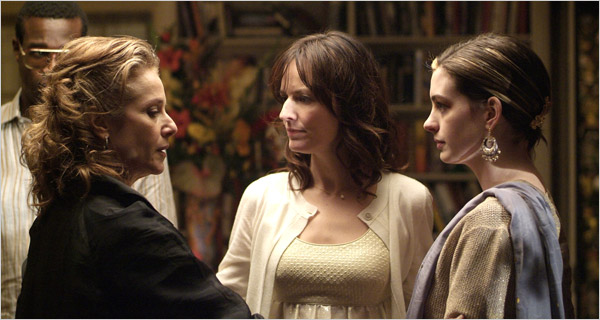|
Reviews of Recent Independent, Foreign, & Documentary Films in Theaters and DVD/Home Video

RACHEL GETTING MARRIED
Weddings are an irresistible setting for a movie, bringing deep feelings from the past, present, and for the future together in one place for a set, ritualized event. There is no shortage of comedies, satires, and dramas that have mined it, including the master of the cross-talking ensemble, Robert Altman. Director Jonathan Demme stylistically, and in the credits, salutes Altman in Rachel Getting Married, but instead of Altman’s class-conscious A Wedding, Demme focuses on family as the place where, when you have no where else to go, they have to take you in. Especially when you are once again awaiting temporary leave from rehab, like the tense, chain smoking Kym. (Haggard-looking Anne Hathaway is definitely not in her fashionable princess guise). She lets everyone know they are in for a bumpy ride from the moment her wary father (Bill Irwin) and stepmother (Anna Deavere Smith) pick her up. Kym is full of nasty quotable quips that put this film at first in very similar territory with the sibling rivalry of wit vs. placidity in Noah Baumbach’s Margot at the Wedding. But her sister Rachel (Rosemarie DeWitt) is equally determined to be the center of attention on her big weekend, for once. The battle lines are drawn, and the no-holds-barred weapons from their dysfunctional past are drawn at the most unexpected times, with enough guilt to go around for everyone. Hathaway sympathetically turns on a dime from wildly inappropriate sarcasm (that goes on with too many bon mots bombs) to exhaustedly searching for the power to get through another day sober. Rachel melts adoringly with her fiancé, but DeWitt does not play her as a softie. Rachel pulls no punches staunchly confronting her sister. As much through body language as words, passionate exchanges among the family members are realistically unresolved, particularly with Debra Winger as their troubled mother. Some of the details in the characters’ back stories don’t completely mesh, but the gaps could be less from Jenny Lumet’s script than the improvisational encouragement of the quick-take filming. (The audience can very much appreciate Hathaway spontaneously shouting out to the front porch musicians to stop their constantly noodling during an intense scene.) But whatever some factual vagaries, the emotional force from the characters is of hurricane strength. When some calm or joyous scenes seem to wander too long, they are just a lull before the next gale. Declan Quinn’s hand-held cinematography is a co-star. Sometimes his spontaneous choices work magic—in particular a lovely scene where Kym hesitantly enters a child’s preserved bedroom, and she stands in dark silhouette against the bay windows with the musicians’ mournful music wafting in. Other times, he dizzyingly follows the actors around from room to room in the family’s large Connecticut house. It seems as if he must have signaled the actors to quickly turn on that lamp in the corner because arguing in the dark was becoming too thick a visual metaphor. The determinedly multicultural wedding décor, finery, and lively music curiously emphasize Indian motifs, a trend that was lampooned in 27 Dresses. The script by Lumet, granddaughter of Lena Horne and daughter of director Sidney Lumet, does not remark that the wedding is an interracial union—unless Tunde Adebimpe’s performance is intended as a subtle satire of Sidney Poitier as the staidly too-perfect fiancé in Guess Who’s Coming to Dinner. This Sidney is supposed to be a music producer, not a stretch from Adebimpe’s day job as an indie rock star in the band TV On the Radio. So it’s surprising how bland he is, especially compared to his charming performance as a depressive in Jump Tomorrow. For trivia buffs, the film is full of references to other Demme films. The officiant is the subject of his Cousin Bobby, the wedding singer from Storefront Hitchcock, and Roger Corman plays a wedding videographer. (The film’s Website includes the seating chart for the wedding and explanations of the guests’ connections to Demme’s films and family.) For my
family, now in the midst of preparations for a spring bicultural
wedding, there are both suggestions and warnings to learn from this
film—we were wondering how to incorporate the elephant image of Ganesh
and hadn’t considered matching the earrings for the bridal
party. We are still optimistically inviting the cousins in recovery,
though. Well, some of them. Nora Lee
Mandel
|

